![]()
- Editorial - We need your response!
- Recognition for the BiofuelsTP
- Latest Work Group Activities
- Timetable of Future Activities
- Become a Biofuels TP Stakeholder
- BiofuelsTP Consulation Process
- Plenary Meeting
- Strategic Energy Technology Plan (SET Plan)
- Public Presence, Actions and Contributions
- Use of BiofuelsTP website
Mission Statement
The mission of the European Biofuels Technology Platform (Biofuels TP) is to contribute to the development of sustainable, cost-competitive, world-class biofuels technologies, to the creation of a healthy biofuels industry and to accelerate the deployment of biofuels in the European Union through a process of guidance, prioritisation and promotion of research, development and demonstration.
 We
need your response!
We
need your response!
We are pleased to announce the Biofuels Technology Platform received official recognition from the European Commission in April 2007.
Through the combined efforts of some 150 individuals the BiofuelsTP is now in a position to present the individual reports from the working groups that will be combined to produce the draft Strategic Research Agenda (SRA) and Strategic Deployment Strategy (SDS). These have been placed on the website under Activities.
This Newsletter now brings you up-to-date on progress and outlines the consultation process and publication plans as well as providing preliminary information about the Stakeholders Plenary meeting where the report will be open for public discussion in January 2008.
Hence, the main aims of this newsletter are to:
- Show how the workgroups reached their preliminary conclusions
- Detail development of the Stakeholder Facility
- Indicate what will happen between now and September when the draft SRA and DS will be available
- Outline the Consultation Process
- Let you know that this will be presented at the Plenary Meeting in early 2008.
- Detail the BFTP contribution to the SET Plan Expert Consultation
- Provide details of other activities to which the BiofuelsTP has contributed.
- Look at BFTP in a European Context
- Review The Global Perspective for Biofuel
However, we do not regard this as a one-way process. Contributions expressing views to be taken into consideration by the BiofuelsTP or questions concerning activities and plans are welcome at any time. We also welcome contributions to the website, such as notification of meetings, reports or other inputs. Questions should be addressed to the secretariat, while contributions to the website can be offered through the webmaster.
So far the BFTP has done the work and produced the Newsletter. For the next issue we would like to invite contributions from our readers and users of the website. Let us have news of projects, activities and technical advances that are shaping the future of biofuels in your sector of interest. Short articles, up to 1000 words, illustrated by one or two photos would be ideal.
While all contributions are welcome, the administrative bodies of the platform reserve the right to use these in the best way to further the aims and objectives of the activity and to place the material in the public domain. Hence, please do not submit confidential material or material subject to copyright by third parties.
Our main route of communication with you is through periodic bulk emailing to registrants. As the consultation process progresses and further details of the proposed Plenary meeting become available we will keep you informed through these periodic emails. Hence, if you want to be kept up-to-date and you have not yet done so, please register with the BiofuelsTP on-line.
The BiofuelsTP Secretariat
July 2007
 Recognition
for the European
BiofuelsTP
Recognition
for the European
BiofuelsTP
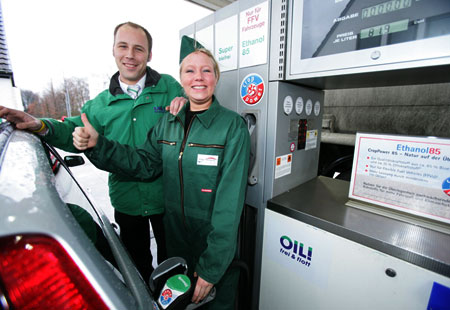
Biofuel filling station © cropenergies
In its meeting of 26 April 2007 the European Technology Platform Interservice Group decided to follow the recommendations of the Emerging Initiatives Working Group WGEI) to formally recognise the European Biofuel Technology Platform. It fully supported the recommendations made by the working group, which were as follows:
The WGEI considered this initiative to be well established and fulfilling all necessary criteria, in particular in terms of industry leadership and commitment; participation of stakeholders, including Member States; openness and transparency; response to policy needs; technology drive and quality of strategic research agenda.
The WGEI therefore supports this initiative. It recommends that this initiative cooperates strongly with ETPs in the sector of biomass production (Plants for the future; Forestry, etc.) and conversion (SusChem and in particular it's sub-sector on industrial biotechnology) and users of fuels (transport related ETPs). Cooperation with other ETPs in the area of renewable energies is also strongly recommended.
Most of the activities of the European Commission are carried out within
the
various Directorate generals (DGs) which assume responsibility for a
specific area of activity, such as research, energy or agriculture. However,
some activities cut across the activities of a number of DGs. These
cross-setcor activities are covered by Inter-Service Groups (I-SG) or
Initiatives Working Groups within which all those DGs with interest in the
particular topic are represented.
Such activities have been initiated some time ago to cover Technology
Platforms (TP), with around 15 DGs participating in the TP I-SG, which
establishes an expert contact from the Commission Staff for each TP. In the
case of the BiofuelsTP, the contact is Jeroen
Schuppers.
The purpose of the I-SG is to provide transparency within Commission
services, to exchange 'good practices' and to ensure that there is a unified
approach from the Commission to external parties ensuring that it is
speaking with one voice.
For this reason the Commission has set up some procedures to assist TPs
although it should be noted that the Commission plays no part in directing
the TPs and at the same time are not bound to act on the views expressed.
However, since the TPs are recognised as 'European' common interest groups
the Commission has set up a number of criteria that should be met before the
TP is officiallly recognised as representing the particular sector - in this
case liquid fuels for transport.
This involves a three-stage assessment covering science and technology, the
broad-based economic benefits and crucially, the European added value. This
implies first that there is a need, that the subject matter is not
covered adequately by another Platform or common interest group, that it has
the commitment of stakeholders and the endorsement of public authorities
while the associated industry is ready to commit high levels of sustained
financial & human resources, and a suitable technical & managerial
framework has been established.
This takes some time as the interest, commitment and
administrative structure has to be established and then shown to be working.
This, as illustrated by the information on this website, is now clearly the
case, and in April the European Technology
Platform Interservice Group accepted the recommendation of the WGEI to formally
recognise the European
Biofuel Technology Platform.
 Latest
Work Group Activities
Latest
Work Group Activities
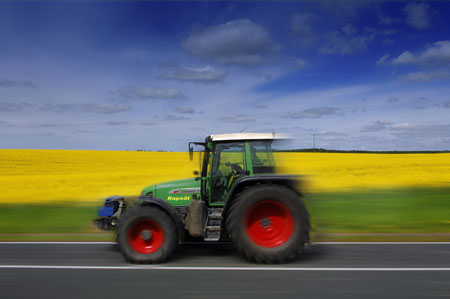
Full speed ahead for the BiofuelsTP Work Groups! © FNR 2007
Members of the workgroups were selected from the many representatives of stakeholders who responded to the initial call for Public consultation on the Vision Report of the Biofuels Research Advisory Council (BIOFRAC) that closed in April 2006.
Although over 300 people expressed an interest, for reasons of practicality the size of each WG had to be limited to around 25 individuals, precluding the participation of many who had expressed an interest in response to this call. As detailed below, if you were not selected, you can now register your interest as a Stakeholder.
During the first months of 2007 each workgroup met on average three times, circulating information, ideas and comments to move towards a consensus. This led to the publication of the draft reports, put together by the WG chairs and vice-chairs and passed to the Secretariat in the latter part of June and added to the website in early July, as follows:
WG1 Biomass Availability and Supply
WG2 Conversion
WG3 Product Distribution and Use
WG4 Sustainability
WG5 Marketing
These summary drafts form the basis for the draft SRA and DS which will be brought together by the Secretariat and presented to a Task Force (made up of selected members from the SC and WGs) that has been set up to authenticate these contributions. This version will then pass to the SC for final ratification and the documents will then go to consultation, first to stakeholders and then to the public at large.
 Timetable
of Future Activities
Timetable
of Future Activities
Early July The draft reports from the WGs are placed on the public area of the BFTP website.
18 July A draft document compiled from the reports will be placed in the Members Area and respresentatives of the Work Groups and Steering Committe (Taskforce) will be invited to send comments to the Secretariat by the 1st August.
30 July Meeting of the Taskforce
1 Aug Comments from the Taskforce will be integrated into the compiled document.
16 Aug Document circulated to the Steering Committee
6 Sept Steering Committee meets to approve document
15 Sept The document is placed in the Stakeholders area on the website for Stakeholder Consultation.
24 Sept The document is placed in the public area of the website for general consultation. This will be announced to all registrants and highlighted in the 'News box' on the website.
26 Oct Consultation ends. Inputs from both stakeholders and public bodies are collated by the Secretariat and reported to the SC.
5 or 8 Nov SC meeting to approve the report for printng
15 Nov Report goes to printer
31 January Stakeholder Meeting in Brussels
 Become
a BiofuelsTP Stakeholder
Become
a BiofuelsTP Stakeholder
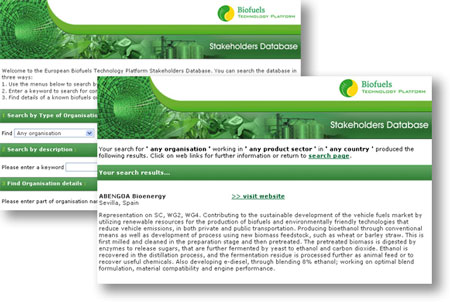
The newly launched database already includes over
100 organisations
A stakeholder is any organisation whose commercial or business activities affects, or can be affected directly by the actions taken by the actions or recommendations of the BiofuelsTP. Hence, stakeholders can include: businesses, corporations and other organisations involved in supplying any components of the overall chain from biomass production, through utilisation, conversion, distribution and end use. This includes both direct involvement with the biomass component, as well as manufacturers and suppliers of equipment for any stage of the overall process including engines and vehicles. Plant breeders, seed suppliers, design and contracting engineering companies, fuel distribution bodies and fleet management companies are other examples of business stakeholders.
Since a primary purpose of the BiofuelsTP is the identification of research priorities stakeholders also include research institutes and university departments actively engaged in biofuels research.
A wide range of support organisations or common interest groups are also stakeholders. These include, Farm of Forest Unions, Professional Associations, Industry trade groups, Learned Societies, NGOs and other special interest advocacy or lobbying groups including those interested in the environment and sustainability.
As indicated above, many representatives of such stakeholder organisations were not able to participate in the first round of activity involving the WGs. Now, we are in a position to include all of you in the on-going consultation process. In order to clearly identify those with a specific interest in contributing to the final recommendations of the SRA and SD and to assist the Secretariat in administering your inputs a stakeholder registration system has been set up on the website. Registrants, who are invited to indicate their interest using the Stakeholder application form, will have the following benefits:
- Access to the Stakeholder restricted area on the website
- Through this area – preferential access to the SRA and DS during
- The Stakeholder Consultation
- Access to the Stakeholder Forum
- Listing on the Stakeholder database in the Public Area of the website.
This will ensure that views, opinions and questions from Stakeholders are given priority during the final revision of the SRA and DS.
It should be noted that in general a Stakeholder is an organisation, not an individual (although individuals such as consultants are of course not precluded). Hence, the person nominated (registering) should hold a position of suitable authority to represent the views of the organisation concerned.
In order to launch the Database of Stakeholders a number of initial entries have been added by the Secretariat, based in the first instance on those organisations that are represented on the BiofuelsTP Steering Committee and Work Groups as well as a number of European Associations and other Common Interest Groups whose members are directly involved in the biofuels production chain (agriculture, forestry, seeds, biodiesel or bioethanol producers) or end use (fuel companies and vehicle manufacturers).
Registering for Stakeholder consultation
If you wish to register in the Stakeholder consultation, in the first instance you may wish to check the database. If your organisation is represented on the Steering Committe or within one of the Workgroups this is indicated within the database. You can find the name of the person representing your organisation on the relevant sector of this website and may wish to discuss your views with them in order to present a consistent corporate view.
If your organisation, or department, is not represented on the database, please register or encourage your organisation to nominate a suitable representative.
Stakeholders who register will be sent a user name and password to enable access to the Stakeholder Area as well as benefiting as indicated above.
 BiofuelsTP
Consultation Process
BiofuelsTP
Consultation Process
Once the final draft document has been prepared (September 2007) we will be looking for a wide ranging response from all those interested in or critical of the development of biofuels for transport, in order to ensure it is truly representative of the European Community as a whole.
You can make your views known by participating in the consultation process.
This will taking place in two stages.
Phase 1. Stakeholder consultation - September 15 to October 26. In
the
Stakeholder Consultation we are looking for responses that represent a
corporate view, rather than the views of individuals. To help streamline
this process we have set up a 'Stakeholders' area on the website. Further
details on how to register, and the benefits of registration are detailed
below.
Phase 2. After about 2 weeks, the consultation will go public with the draft
documents on the public area of the website. This will enable anyone who
wishes to give their personal view to submit comments.
Further details of this process, as well as on-line questionnaire and/or
reply forms will appear on the website in due course and will be circulated
to registrants by email.
In order to ensure complete transparency responses will be collated in an
on-line database that will become public at the end of the consultation
process.
 Plenary
Meeting
Plenary
Meeting
A Plenary Meeting will be held in conjunction with the EU Sustainable Energy Week, which takes place from Monday 28 January to Friday 1 February 2008. The meeting will be held in Brussels, possibly on the 31st January (venue to be confirmed).
 Strategic
Energy Technology Plan (SET Plan)
Strategic
Energy Technology Plan (SET Plan)
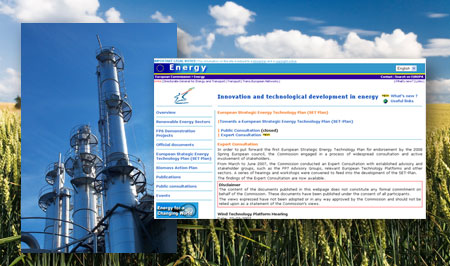
Since the BiofuelsTP was launched there have been significant developments in the framework for development of biofuels for transport, both within the EU and globally. Most notable are the adoption of EU policy, launched in January 2007, which set new targets for biofuel production, proposals to modify the biofuel directive and the development of a Strategic Energy Technology Plan (SET Plan). The background and main points emerging from this are considered in more detail below.
As part of the Expert Consultation the BiofuelsTP was invited to contribute to the evolution of the SET Plan as it is developed by the Commission in order to bring proposals to reality.
In order to have the SET Plan available for endorsement by the European council in Spring 2008 the Commission engaged in a process of widespread consultation that included active involvement of stakeholders. In addition to a public consultation, from March to June 2007, the Commission conducted an Expert Consultation with established advisory and stakeholder groups, such as the FP7 Advisory Groups, relevant European Technology Platforms and other sectors through a series of hearings and workshops.
These workshops included one involving the BiofuelsTP that took place on 3rd May 2007. The summary of this meeting is available in the download section of the BiofuelsTP website. Subsequently, the SC and Secretariat collaborated to produce written answers to some of the questions raised, although some limitations exist since a concensus BiofuelsTP viewpoint has yet to be reached, while answers to some questions concerning the long-term (2030) contribution of biofuels to EU transport needs remain highly speculative since they are largely dependent on three factors:
As part of the follow-up process the BFTP submitted a following proposal for an EU initiative in the SET-Plan: Bio-track (link to pdf on downloads) and responded to subsequent questions.
 Public
Presence, Actions and Contributions
Public
Presence, Actions and Contributions
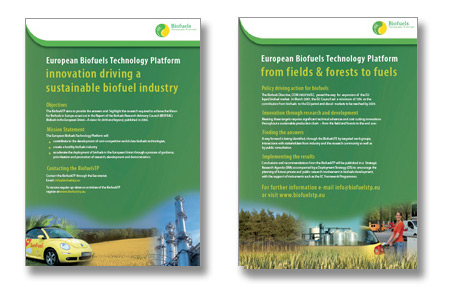
Promotional posters shown at recent Biofuels events
Members of the Steering Committee, Secretariat and/or Work Groups have attended
various meetings and conferences as follows:
4th Forest-Based Sector TP, Future Lead markets of the Forest-Based Sector, Hanover, Germany, 15 – 16 May 2007 - BiofuelsTP presentation by Markku Karlsson, Steering Committee Member
Meeting on bio-based products lead market - Brussels, Belgium, 22 May 2007 - attended by Ricardo Arjona, Co-chair of WG2
2nd EPOBIO Workshop: Products from Plants - from crops and forests to zero-waste biorefineries Athens, Greece, 15 -17 May 2007 - Poster presentation of BiofuelsTP by Dr Jim Coombs, EBFTP Secretariat
Information Workshop on Agricultural Engineering and Technologies (AET) in the context of European research on 07 June 2007 in Brussels, Belgium – EBFTP represented by Jeroen Schupper (EC)
Turning Second Generation Biofuels into a Reality, National Non-Food Crops Centre Event, London, UK , 21st June 2007 - EBFTP represented by Dr Jim Coombs, EBFTP Secretariat
Seminar of the Industrial Leaders of the European Technology Platforms, Brussels, Belgium, 21 June 2007 - EBFTP represented by Alexandre Rojey, Chair of WG2
Meeting of representatives of ETPs (and other Energy sector groups with no ETP) with Commissioners Potocnik (Research) and Piebalgs (Transport & Energy) as an input to SET-Plan Initiative, 22 June 2007 - EBFTP represented by Luis Cabra, Chair of the Steering Committee
Launch of the Strategic Research Agenda of the ETP Plants for the Future, European Parliament, Brussels, Belgium, 25 June 2007 – EBFTP represented by Dr Steffen Daebeler, FNR, Germany
“Towards future challenges of agricultural research in Europe”, The Standing Commitee on Agricultural Research (SCAR), Brussels, Belgium, 26-27 June 2007 – Presentation by Popi Panoutsou, Imperial College, UK
International Conference on Biofuels, Brussels Belgium, 5-6 July 2007 - presentation on EBFTP by Olivier Appert, Co-chair of the Steering Committee
 Use
of BiofuelsTP website
Use
of BiofuelsTP website
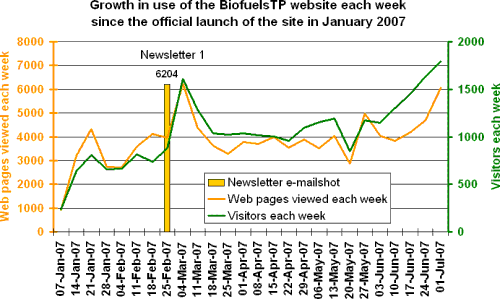
The use of the BiofuelsTP website is recorded on a weekly basis and the results graphed as shown in the figure above. This is published on the website and can be reached through the link at the bottom of the home page.
As shown the website is attracting a satisfactory number of visitors and showing steady growth. The impact of producing the newsletter, and emailing to inform registrants of the availability of new information can also be seen – so if you are not on the email list please register.